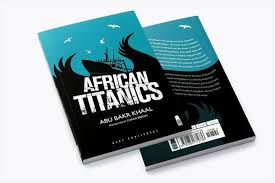Dying to Reach Europe: The African Immigrant Crisis
Reviewed by Aisha K. Nasser
African Titanics
By Abu Bakr Khaal
Translated by Charis Bredin
London: Darf Publishers Ltd, 2014.
(First published in Arabic by Dar al Saqi, London, 2008.)
Media accounts normalize the tally of illegal African immigrants drowning while crossing the Mediterranean. Eritrean novelist Abu Bakr Khaal disrupts this false sense of normality by giving voices to these immigrants. His short novella, “African Titanics,” offers accounts of the journeys of three African immigrants, among numerous other minor characters.
The sardonic title, “Titanics,” which the Eritreans have given to the shabby boats that cross the Mediterranean overloaded with illegal immigrants, emphasizes the slim chances of survival and the miserable state of the boats at the onset of their voyages. With barely 40% chance of surviving, these boats are destined to tragedy. One may then wonder why immigrants venture into these boats if they know beforehand that they probably will not survive? Why do they venture across the great Sahara Desert and face the Hambata, brutal robbers who loot vehicles along the roads? Why do African immigrants venture into the sea and the desert knowing perfectly well that “one’s a devil, while the other’s a demon”?
Khaal’s answer to these questions, while referencing the ‘immigrant bug’ that infects the minds of young Africans, demonstrates how that mythical bug has its roots in more mundane circumstances. Intertwining local politics with colonial and postcolonial histories to produce a narrative deeply rooted in African cultures and histories, Khaal recounts some of those roots. They include senseless wars between ‘identical’ battling parties who ‘couldn’t be told apart’; political corruption (where the authority figures ‘abuse their position’); police corruption (where the khaki uniform wearers amass exceptional power); and colonial histories (which drained the continent of its human and natural resources, and deprived it of its cultures). Khaal’s narrative emphasizes the linguistic, cultural, and historical diversity in Africa, highlighting the paradox of its current marginalization.
As the novella opens, we follow Khaal’s protagonist-narrator, who travels from his native Eritrea to Sudan, crossing the great Sahara Desert into Libya, then journeying to Tunisia. On his journey he befriends Terhas, a fellow Eritrean immigrant, and Malouk, an immigrant from Liberia. The two Eritrean immigrants are arrested in and deported from Tunisia, while the Liberian drowns on board of an African titanic attempting to cross the Mediterranean. Malouk, however, survives as a legend, as wittingly portrayed in the solemn ending.
In this intriguing novella, Khaal cannily avoids pedantically preaching about the grim intertwining circumstances that expel people from their lands and that will soon turn Africa into “a hollow pipe where the wind plays melodies of loss.” Instead he disperses such factors throughout the narrative, carefully enveloping them within the emotional and humane personal narratives of the immigrants. Khaal also sheds light on African folktales, poetry and music, providing the reader with a feast of characters, languages, tales, and a balanced political view. The personal narrative in “African Titanics” deeply touches the reader, while the author’s capacity to use minute details to humanize the immigrants and the rich, diverse heritage of the African continent alternately surprises and fascinates.
Source : http://www.aljadid.com/content/dying-reach-europe-african-immigrant-crisis
Short URL: https://english.farajat.net/?p=10133
















